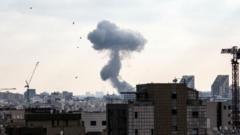The United States' recent airstrikes on Iranian nuclear sites signal a significant escalation in Middle Eastern conflict, prompting mixed reactions globally and raising questions about the future of U.S.-Iran relations.
U.S. Strikes on Iran: A Escalation in Middle East Conflict

U.S. Strikes on Iran: A Escalation in Middle East Conflict
Tensions Rise as U.S. Military Targets Iranian Nuclear Facilities and the Fallout Begins
In the early hours of yesterday, the U.S. military initiated strikes on three critical Iranian nuclear facilities, notably targeting the heavily fortified Fordo site, which now faces substantial damage. This operation comes after President Trump's statement hinting at a potential regime change in Iran, intensifying fears of broader conflict in the region.
Reports suggest that the extent of Iran's nuclear capabilities remains uncertain, particularly if any of its near-bomb-grade uranium stockpile has been relocated prior to the strikes. U.N. nuclear authorities have indicated that they believe the stockpile may have been moved, leaving U.S. officials without knowledge of its current location. In response to the attacks, Iranian officials, led by Foreign Minister Abbas Araghchi, have vowed to protect their national interests, asserting they will consider all available options.
The strikes by the United States have already instigated a heightened alert among Iranian-supported militias, with indications they may target American bases in Iraq and Syria imminently. It is widely believed that these developments will further escalate tensions between the U.S. and Iran, complicating any existing diplomatic efforts aimed at resolving the ongoing hostilities between Iran and Israel.
Analysis of President Trump's decision reveals a strategic alignment with pro-Israel hawks, clearly favoring military action over negotiation, which could close pathways to a peaceful resolution. Responses from the international community range from condemnation to calls for restraint, with Gulf nations expressing concern over potential retaliation from Iran.
On the ground in Iran, citizens have voiced disbelief at how quickly the situation deteriorated, with one man remarking, "None of us expected that, within six or seven days, we’d reach this point.” This sentiment underscores a pervasive anxiety among the population about the potential for a protracted conflict. As the situation develops, experts warn that U.S. actions may inadvertently galvanize Iran’s determination to pursue nuclear capabilities, raising further implications for regional stability.





















